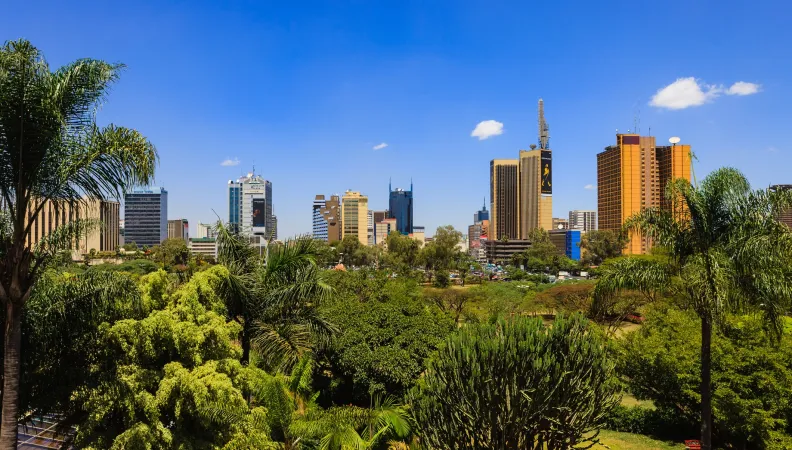Share the page
Tackling the dual challenge of urbanisation: support from the private sector
Published on
Salim Bensmail Head of The Urban Resilience Fund Meridiam

Private Sector & Development #40 - Sustainable cities: how private sector players are gearing up
By 2050, almost 70% of the population of developing countries will be living in cities. Deploying sustainable urban infrastructure and services is a massive challenge.
All twenty-first century cities have to both meet the essential needs of their populations and adapt to the effects of climate change. In emerging countries, this dual challenge is being exacerbated by constantly increasing rates of urbanisation. To cope with this situation, we need to foster partnerships between the public and private sectors, as demonstrated by the projects supported by Meridiam.
By 2050, almost 70% of the world’s population will live in cities, meaning an extra 2.5 billion urbanites over the next 30 years. However, urbanisation differs from one region to another. In North American and European cities, the population is actually shrinking and ageing, whereas emerging countries are experiencing sustained urban growth - almost 950 million people are expected to move to African cities by the middle of the century. This growth means an exponential increase in the need for essential infrastructure. But as cities are developing, they need to reinvent themselves in order to combat the effects of climate change and reduce their carbon footprint.
These challenges are as diverse as they are urgent. Coastal cities in China, Latin America and Africa are exposed to risks from rising sea levels, while inland cities in Africa and India have to grapple with the threats of extreme heat and drought. These developments represent a massive challenge for both the public sector (i.e., governments and municipal authorities) and the private sector (developers and managers of essential infrastructure, investors, insurers, etc.). Cities need to grow and invest in protecting themselves, while at the same time reducing their environmental impact.
INVESTING IN THE DUAL CHALLENGE OF URBANISATION
But this context also provides an opportunity to rethink urban spaces in a more sustainable way, based around renewed partnerships between the public and private sectors. For many years now, Meridiam has been a developer and investor in large-scale essential infrastructure projects in partnership with central governments and the local authorities of major cities in Europe, North and South America and Africa. The company’s funds are aligned with United Nations’ Sustainable Development Goals (SDGs): clear objectives are set out (and measured) for each of its investments.
Meridiam focuses primarily on SDG 11, “Making cities and human settlements inclusive, safe, resilient and sustainable.” This covers all the sectors in which Meridiam invests: from essential public services to delivering sustainable mobility and carbon-light solutions. In 2021, Meridiam launched “The Urban Resilience Fund” (TURF) in partnership with the Rockefeller Foundation, an initiative aimed specifically at helping European and African cities to tackle the dual challenges of urbanisation and managing the consequences of climate change. TURF invests in high-impact infrastructure projects to build resilient and sustainable cities. It allows Meridiam to work with cities in the pre-project phase to devise innovative solutions designed to meet multiple challenges. TURF is supported by a catalytic fund of almost €20 million, which can be used to finance project preparation studies.
In partnership with public authorities, Meridiam has developed a range of projects to help make cities more resilient, sustainable, inclusive and safe. For example, as part of a joint venture with the Mauritanian government, the TURF fund is working on a project to safeguard the Nouakchott coastline that will protect over 75,000 people living in areas at risk of flooding (because of rising water levels). Dakar Bus Rapid Transit (BRT), for which Meridiam is the concession holder, will deploy some 121 electric buses onto the roads of the Senegalese capital, transporting almost 300,000 people, while avoiding almost 59,000 tonnes of CO2 emissions every year. Meanwhile, in the Finnish town of Espoo, 4,000 places in schools and crèches - developed and financed by Meridiam - provide the population with a functional and healthy early learning environment.
DIFFERENT MODELS FOR LONG-TERM PARTNERSHIPS
Obviously, to tackle the multiple challenges involved in building sustainable cities, public players play a key role in setting the objectives, devising the sustainable development strategy and the priorities to be deployed. Private players for their part, develop the projects and provide technical expertise together with their innovation capabilities.
Various legal structures and business models can be deployed for these purposes. Obviously, these include concession-based public-private partnerships as well as private arrangements featuring medium - or long-term buy-back commitments by public operators, such as those existing in the energy sector. Project development joint ventures offer a transparent framework for flexible cooperation between public authorities and private players, especially in the project design and development stage (as illustrated by the Nouakchott project).
Aside from their diversity, what all of these models have in common is that their success depends on a close alignment of public and private stakeholder objectives and values. As a company with a mission, Meridiam has mainstreamed the UN SDGs into its corporate purpose, strategy and the design of its infrastructure projects. Its strategy as a long-term investor (with project investment horizons of at least 25 to 30 years) is also conducive to a very close alignment of interests with public players and a capacity to make long-term commitments to project objectives.
As we know, private investors play a key role in supporting public players, however the total volume of investment in climate change mitigation remains largely insufficient. It is by focusing on these long-term partnerships that the necessary funds can be raised.

